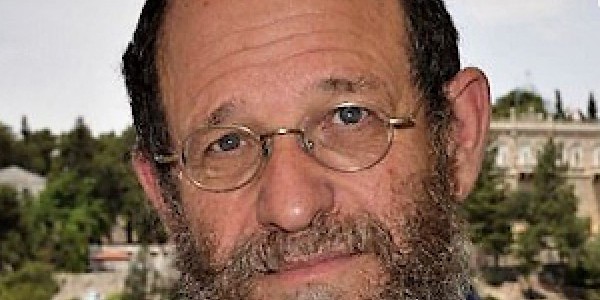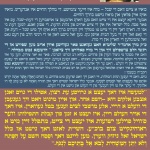Koronawirus - duchowa wiadomość z Brooklynu
Konsultacje #coronaspection
20/03/2020 | Na stronie od 01/04/2020

Alon Goshen-Gottstein
Źródło: Blog Rabina Alona Goshen-Gottstein
Religia, jak dotąd, nie radzi sobie dobrze z obecnym koronowym kryzysem. Nie mam na myśli jedynie faktu, że praktyki religijne (wszystkich religii) są utrudnione ze względu na koronowo indukowane zamknięcie instytucji religijnych. Nie odnoszę się również do tego, że religia żydowska stała się źródłem podziału i krytyki, ponieważ niektóre władze rabiniczne nie zastosowały się do instrukcji urzędników, dotyczących tego, jak jednostki i społeczeństwo muszą zachowywać się w tym okresie. Myślę o wyzwaniu z zakresu dostarczania znaczeń w czasach kryzysu. Kto, jeśli nie głosy religijne, poprowadzi nas przez te trudne czasy? Niestety wiadomości, które otrzymujemy, głównie za pośrednictwem mediów, są trywialne i zbyt często śmieszne. Gosy religijne nie mogą być traktowane poważnie, kiedy dyskusja o odpowiedzi religii na Koronę zostaje sprowadzona do homofobicznych uwag jednego rabina. Lub nawet wtedy, kiedy jest zredukowana tylko do apelu, kierowanego dobrymi intencjami, aby bardziej rygorystycznie przestrzegać szabatu, co zakłada, że pandemia jest karą za profanację (świętego czasu). Ale faktem jest, że prawie wszystkie religijne autorytety i przedstawiciele grup wyznaniowych zajmują się tym, jak podtrzymywać lub jak zrezygnować z pewnych aspektów praktyk religijnych. Natomiast prawie nic nie oferuje się w formie pocieszenia, wsparcia i wskazówek.
Wczoraj otrzymałem na whatsappie tekst w języku jidysz z Borogh Park, dzielnicy Nowego Jorku, której mieszkańcy są w większości ultraortodoksyjni i nastawieni pro chasydzko. Jest to jedna z dzielnic najbardziej zagrożonych korona-kryzysem. Tekst, który otrzymałem, pochodzi od Rabina z Lelow (dynastii Lelowskiej), rabina Jakuba Icchaka Bidermana. Otrzymałem ten tekst, ponieważ przyjaźnię się z Rabinem. Jestem miłośnikiem jego wybitnie duchowej pobożności i bliskie są mi jego poglądy. Moim zdaniem Rebe jest jedną z najbardziej głębokich duchowych osobowości we współczesnym judaizmie i osobą, która konsekwentnie stosuje perspektywę duchową (w przeciwieństwie do perspektywy religijnej lub rytualnej) w swojej praktyce i swoim spojrzeniu na życie. Biorąc pod uwagę, że obecnie brak duchowych odpowiedzi, postanowiłem udostępnić szerszej publiczności jego krótki tekst. Chociaż wypowiedź jest ujęta w bardzo specyficznym żydowskim kontekście, to przesłanie jest znacznie szersze. Moim zdaniem tekst może przemawiać do każdego, kto prowadzi życie duchowe, to znaczy życie skoncentrowane na wewnętrznych procesach duchowych, na podnoszeniu świadomości i na kształtowaniu wewnętrznego podejścia do zewnętrznych rzeczywistości życia. Paradoksalnie tekst ten może przemawiać bardziej do wielu nie-Żydów, którzy mają duchowe podejście do życia, niż do Żydów, którym brakuje takiej perspektywy, nawet jeśli formalnie są oni religijni. Ponieważ w życiu duchowym nie ma „jednego przesłania dla wszystkich”, oferuję własny przekaz tekstu Rabina z nadzieją, że znajdzie on echo w sercach niektórych czytelników i że tacy czytelnicy znajdą się we wszystkich środowiskach. Po moim przekazie tekstu zamieszczam dodatkowe nauczanie Rabina, a następnie mój krótki komentarz, który sytuuje tekst w szerszym współczesnym kontekście.
W odniesieniu do sytuacji na świecie
Jest to czas, kiedy umysł jest bardzo zdezorientowany. Codzienny bieg życia zmienia się. Jesteśmy zamknięci w jednym miejscu i sprawy nie biegną tak, jak to zazwyczaj w życiu bywało.
W tym właśnie czasie musimy pracować nad budowaniem (tj. podnoszeniem) naszego umysłu i świadomości. Mamy czas przed Pesach (Paschą). To jest czas, kiedy wyszliśmy z wygnania świadomości. Werset (Wj 6,7) mówi: „I poznacie, że Ja jestem Pan, wasz Bóg (który wyprowadza was z cierpienia Egiptu)”. To musi być czas, aby świadomie (duchową inteligencją, da'at-sechel) głosić sobą Bożą królewską godność. Umysł i głowa powinny rządzić ciałem. Nie należy dopuszczać do tego, aby uczucia ulicy (tj. nastrój publiczny) dezorientowały serce i umysł.
Jeśli ktoś czuje, że jego uczucia sieją spustoszenie, a człowiek traci rozum, powinien recytować: hosza'ena nefesz mibehala ( הושענא נפש מבהלה - z modlitw Hoszana Raba, siódmego dnia święta Sukot) - „ocal moją duszę od zamętu” (strachu, niepokoju, niestabilności). Ta modlitwa może uchronić przed lękami. Ostatni wielki mistrz Bełza (rabin Aharon Rokeach), 80 lat temu, podczas drugiej wojny światowej, kiedy przechodził przez różne trudne sytuacje, ilekroć coś siało spustoszenie w świecie, siadał i odmawiał tę modlitwę z Wielkiej Hosanny: hosza'ena nefesz mibehala („uratuj moją duszę przed zamętem” itp).
Żyd powinien zawsze pamiętać i wiedzieć, że jest ktoś, kto wszystko nadzoruje (cytat z Midraszu Genesis Rabba 39,1 - W pałacu jest władca). W końcu wspólnota Izraela znajduje się bezpośrednio pod władzą samego Boga (tj. potwierdza szczególną relację Izraela z Bogiem i Jego opatrznością, a nie rządy aniołów i innych pośredników)… Najważniejsza jest egzystencja przewyższająca świat, a nie bycie w świecie.
W praktyce jest to wielki czas "et racon" ( עת רצו - boska wola i duchowa sposobność). Nawet nie-Żydzi głoszą: "to jest palec Boży" (aluzja do Wj. 8,15) - Bóg jedyny. W ciągu jednej minuty świat się odmienił. Wszystkie placówki ludzkiej rekreacji i rozrywki (jidysz: מושבי ליצים) zatrzymały się. Powietrze tego świata jest czyste. To czas, w którym modlitwy mogą być przyjęte! Każdy, kto chce dokonać zbawienia (tj. na modlitwie rozwiązać trudne sytuacje), znajduje teraz czas, aby spokojnie modlić się do Stwórcy wszystkich światów.
Bóg nie dopuści, aby zniszczono wspólnotę Izraela. W końcu czytamy (w związku z Paschą): „ominie Pan takie drzwi i nie pozwoli niszczycielowi wejść do waszych domów, aby was zabijał” (Wj 12, 23).
Dodatkowe nauczanie
Przygotowując ten tekst, rozmawiałem z rabinem Biedermanem i zapytałem, jakie dodatkowe istotne nauki mógłby zaoferować czytelnikom, Żydom i nie-Żydom. Dwa kolejne punkty uzupełniają powyższy komunikat.
1) Nasza dzisiejsza sytuacja przypomina sytuację przeklętego Kaina: „Będziesz niespokojnym wędrowcem na ziemi” (Rdz 4, 12). Możemy zostać zmuszeni do pozostania w naszych domach, ale niepewność naszych umysłów rodzi taki niepokój, że nie możemy odzyskać pokoju. Co zatem jest kluczem do pokoju? Magid z Kozienic, rabin Israel Hopstein (zm. 1814), w swoim "Awodat Israel" odnosi się do znaku Kaina, "ot" w hebrajskim, oraz do midraszowej identyfikacji tego "ot" (znaku) z Szabatem (Genesis Rabba 22,12). Kain jest przeklęty przez zamęt umysłowy. Nawet jeśli zdecyduje się zamieszkać w jednym miejscu, jest pełen obaw aż do szaleństwa. Gdyby był w stanie przywiązać swój umysł do Boga, wszystkie jego lęki zostałyby przezwyciężone. W przekleństwie rządzi nim strach, nad którym nie może się wznieść swoim umysłem. Jednak w szabat udało mu się przywiązać do Boga i odnaleźć pokój. Chodzi zatem o to, że wzniesienie umysłu ku Bogu wynosi nas ponad nasze lęki i rodzi pokój.
2) Jak osoba może przerwać przeklęty krąg strachu, w którym on lub ona są uwięzieni? Żyjąc w teraźniejszości. Cały strach dotyczy przyszłości. Żyj chwilą obecną. Podziękuj za to, co w niej jest. Znajdź dobro w każdej sytuacji. Wszystko, co Bóg czyni, nawet to, co nas trapi, ma w sobie coś dobrego. Wzmocnij dobro teraźniejszości. Pielęgnuj dary i zdolności, które posiadasz tu i teraz. W ten sposób odwróć swój umysł od strachu i niepokoju, które są wytworzone przez myślenie o przyszłości.
Refleksja i analiza
Odkrywam wartość przesłania Rabina w momencie, kiedy jestem zaangażowany w zbieranie wypowiedzi religijnych przywódców różnych religii w reakcji na koronowy kryzys. Jest to czas, kiedy świat potrzebuje otuchy i wskazówek. Wierzę, że religie, wszystkie religie, mają mądrość do zaoferowania. Przeprowadziliśmy (Instytut Eliasza w Jerozolimie) wstępne konsultacje z przywódcami religijnymi z zamiarem zaprojektowania całego procesu koronowego reagowania oraz aby opracować przesłanie inicjujące taki proces. Nazwaliśmy to #coronaspection. Podczas naszych początkowych konsultacji przywódcy religijni wszystkich religii wskazali na strach i panikę jako wielkie źródła niepokoju. Zasugerowali jednocześnie różne możliwe reakcje, co zostanie udostępnione na naszej stronie na Facebooku. Dostrzegam, i poruszyło mnie to, jak bardzo przesłanie Rabina z (dynastii) Lelow jest zgodne z szerszymi znaczeniami wypowiedzi przywódców religijnych z różnych tradycji, oświadczeniami dotyczącymi tego, co dzisiaj świat powinien usłyszeć. I oto, co biorę z przesłania Rabina.
1) Strach i zamęt pomniejszają nas. Strach wydaje się być warunkiem uniwersalnym. Rabi opisuje tutaj stan mentalnego zamętu i dostarcza bardzo praktyczną radę, modlitwę, coś na podobieństwo mantry, która ma uspokoić umysł i wznieść go - „ocal moją duszę od zamętu”. Jego dodatkowe nauczanie oferuje kolejną praktyczną poradę, aby koncentrować się na tym, co dobre w teraźniejszości.
2) Ujawnia się tu spojrzenie na osobę ludzką. Umysł i świadomość tworzą prawdziwą osobę. Ciało i uczucia mogą zakłócać jasność świadomości, wstrzykując strach i niepokój. Naszym celem jest wynoszenie świadomości i wzniesienie się ponad strach. Wiedza i wyższy stan umysłu prowadzą do uznania, że Bóg ma pełną kontrolę.
3) Mamy do czynienia z całościową orientacją na życie. Musimy wynosić naszą egzystencję ponad świat, a nie pogrążać ją w nim. Innymi słowy, nasze umysły i aspiracje powinny utrzymywać nas ponad perypetiami życia, zapewniając tym samym bezpieczną przystań na wzburzonym morzu życia.
4) W genialnym przekształcaniu rzeczywistości, chwila obecna nie jest chwilą Boskiego gniewu. Jest raczej "et racon", czasem łaski, czasem, w którym możemy zbliżyć się do Boga. To całkowicie sprzeczne z intuicją odczytanie chwili opiera się na radykalnej zmianie tego, z czego składa się życie w dzisiejszym świecie. Poza tym wszystko, co mogłoby przeszkadzać na drodze życia duchowego, nagle przestaje funkcjonować. Ktoś mógłby traktować to jako potrzebę znalezienia sensu. Rebe traktuje to jako oczyszczenie atmosfery. Jest mniej „duchowego zanieczyszczenia” i w konsekwencji modlitwa może być bardziej skuteczna. Nie tylko pojawia się większa potrzeba modlitwy. Chodzi o to, że modlitwa będzie teraz bardziej wydajna i skuteczna. To jest najbardziej niezwykłe zaproszenie do modlitwy w tych okolicznościach.
5) Wszystkie te treści związane są z religijnym kalendarzem. Kiedy przygotowujemy się do Paschy, znajdujemy w niej wiele znaczeń, które są istotne w danym momencie. Pascha to czas kształtowania bezpieczeństwa i zaufania w najbardziej intymnej (relacji do) Boskiej opatrzności. To także czas podniesienia świadomości. Prawdziwy Exodus, zgodnie z ogólną nauką chasydzką, jest Exodusem świadomości i umysłu, wynoszącym je ponad udręki świata. Nie jest to tylko Wyjście ciał z niewoli.
Lekcja ta buduje dobre porozumienie poza wąską społecznością, do której osobiście zwraca się Rabin z Lelowa. Przemawiaja do wszystkich, którzy szukają dostępu do życia i sensu w tych niespokojnych czasach. Współbrzmią z tym, co inni nauczyciele innych religii starają się również przekazać w tym czasie światu i są zaproszeniem, aby wykorzystać ten okres do duchowego wyzwolenia i własnej przemiany.
O Autorze
Alon Goshen-Gottstein jest założycielem i dyrektorem Elijah Interfaith Institute. Uznawany jest za jedną z wiodących postaci na świecie w dialogu międzyreligijnym, specjalizującą się w łączeniu wymiaru teologicznego i akademickiego z szeregiem praktycznych inicjatyw, w szczególności z udziałem światowych przywódców religijnych.
Coronavirus – A Spiritual Message from Brooklyn
As part of: Tackling the Fears of Corona Join religious leaders across the world, Jewish, Christian, Muslim and Hindu, for an hour of teaching, prayer and online encounter.
Thus far, religion is not faring all that well during the present corona crisis. I am not referring to the fact that religious practice (of all religions) is hindered by the corona-induced closure of religious institutions. I am also not referring to the fact that Jewish religion has become a source of division and criticism, due to the failure of some rabbinic authorities to comply with instructions of officials regarding how individuals and society must comport at this time. I am referring to the challenge of providing meaning in times of crisis. Who, if not religious voices, will guide us through these trying times? Sadly, the messages that we get, mostly through the media, are trivial and all too often laughable. When the discussion of the religious response to Corona is reduced to homophobic remarks of one rabbi or even the well intentioned call to be more strict in Sabbath observance, and blaming Sabbath desecration for the pandemic, religious voices cannot be taken seriously. The fact is that almost all religious authorities and representatives are concerned with how to keep up, or how to renounce, aspects of religious practice. Almost nothing is offered by way of consolation, support and direction.
Yesterday, I received in my whatsapp a Yiddish text from Borogh Park, a New York neighborhood, whose residents are mostly Hassidic and ultra-Orthodox. It is one of the hardest-hits neighborhoods in the present corona-crisis. The text I received is from the Rebbe of Lelov, Rabbi Yaakov Yitzhak Biderman. I received it because I am personally close to him and am a great admirer of his outstanding spiritual devotion and overall orientation. He is, in my view, one of the most intense spiritual personalities in present-day Judaism, and one who consistently applies a spiritual perspective (as opposed to just a religious or ritual perspective) in his practice and in his view of life. Given the dearth of spiritual responses to the moment, I decided to share this brief text with a broader public. While the text is couched within a very specific Jewish context, its message is much broader. In my view, the text can speak to anyone who has a spiritual life, that is: a life centered on internal spiritual processes, raising of consciousness and cultivating an interior approach to the external realities of life. Paradoxically, this text may speak more to many non-Jews, who have a spiritual approach to life, than to Jews who lack such a perspective, even if they are formally religious. Since in the spiritual life there is no “one message fits all”, I offer the following translation in the hope that it will find an echo in some readers’ hearts and that those readers will be found in all circles. The translation will be followed by an additional teaching, and then followed by a brief commentary, that situates the text in a broader contemporary context.

Regarding the Situation in the World
This is a time when the mind is very confused. The daily course of life is changing. We are locked in one place and things do not proceed as life would usually.
But this is precisely the time when we must work building (i.e. elevating) our mind and consciousness. It is the time before Pesach (Passover). This is the time when we came out of the exile of consciousness. The verse (Exodus 6,7) says: “And you shall know that I am the Lord your God” (who takes you out of the suffering of Egypt)”. This must be the time to proclaim God’s kingship upon oneself consciously (with da’at, mind). Mind and head should rule over the body. One should not let the feelings of the street (i.e. public mood) confuse the heart and the mind.
If one feels that one’s sentiments are wreaking havoc and one is losing one’s mind, one should recite: הושענא נפש מבהלה (from the Hoashanot prayers) – save my soul from confusion (fear, anxiety, instability). This prayer has the capacity to protect one from fears. The late grand master of Belz (Rabbi Aharon Rokeach), 80 years ago, during the second world war, when he went through various difficult situations, whenever something wreaked havoc in the world, he would sit himself down and recite this prayer from the Hoshanot – הושענא נפש מבהלה (save my soul from confusion, etc.).
A Jew should always remember and know that there is someone who oversees everything (citing an expression from Genesis Rabba 39,1 – There is a ruler to this palace). The collectivity of Israel is, after all, directly placed under the hand of God himself (i.e. not under the rulership of angels and other intermediaries, affirming its special relationship with God and his providence)… The main thing is to be higher than the world and not in the world.
In practical terms, this is a great time of עת רצון (divine will and spiritual opportunity). Even non-Jews proclaim “this is the finger of God” )allusion to Ex. 8,15) – the one God. In one minute the world has been turned around. All establishments of human leisure and entertainment (Yiddish: מושבי ליצים) came to a halt. So the air of the world is pure. This is a time when prayers can be received! Whoever wishes to effect salvations (i.e. to bring about solutions to difficult situations, in prayer), now is the time, to pray with peacefulness to the creator of all worlds.
God will not let the collectivity of Israel be harmed. We read, after all, (in conjunction with Passover): “and the Lord will pass over that doorway, and he will not permit the destroyer to enter your houses and strike you down” (Ex. 12,23).
Additional Teaching
In preparing this post, I spoke to Rabbi Biederman and asked what additional relevant teachings he could offer readers, Jews and non-Jews alike. Two further points supplement the message above.
-
Our situation today is much like that of cursed Cain: “You will be a restless wanderer on the earth” (Genesis 4,12). We may be forced to stay in our homes, but the insecurity of our minds creates a restlessness in which we can find no peace. What, then, is the key to peace? The Magid of Kozhniz, Rabbi Israel Hopstein (d. 1814), in his Avodat Yisrael refers to the mark of Cain, אות in Hebrew, and to the midrashic identification of this אות with Shabbat (Genesis Rabba 22,12). Cain is cursed with mental confusion. Even if he chooses to dwell in one place, he is full of fears to the point of insanity. Had he been able to attach his mind to God, all his fears would be overcome. His curse is being ruled by fear, unable to raise his mind above it. However, on Shabbat he succeeded in attaching himself to God, and found peace. The point, then, is that raising our minds to God elevates us above our fears and generates peace.
-
How can a person break the cycle of fear in which he or she is trapped? By living in the present. All fear relates to the future. Live the present moment; give thanks for what there is; find the good in every situation. All that God does, even that which troubles us, has some good in it. Amplify the good of the present, cultivate the gifts and capacities you have in the here and now, and thereby turn your mind away from the fear and anxiety that are generated by thinking of the future.
Reflection and Analysis
I am particularly appreciative of the Rebbe’s message because at this very point in time I am involved in collecting responses from religious leaders of different religions to the corona crisis. It is a time when the world needs comfort and guidance, and I believe religions, all religions, have such wisdom to offer. We (the Elijah Institute) convened an initial consultation of religious leaders in order to design a process and develop initial messaging for the corona response process. We’ve called it #coronaspection. In our initial consultation, religious leaders of all religions identified fear and panic as the great sources of concern and suggested various possible responses, which will be shared on our Facebook page. I was, therefore, struck by how closely the message of the Lelover Rebbe fell in line with the broader sentiments of religious leaders of diverse traditions regarding what the world needs to hear. So, here is what I take from his message.
- Fear and confusion are what weaken us. Fear seems to be a universal condition. The Rebbe describes here the mental state of confusion and provides a very practical advice, a prayer, a mantra-like, that is meant to calm the mind and to elevate it – “save my soul from confusion”. His supplementary teaching offers further practical advice, in focusing on the good in the present.
- There is a view of the human person implied. Mind and consciousness are the true person. Body and feelings can get in the way of clarity of consciousness, injecting fear and anxiety. Our goal is to raise our consciousness, to rise above fear. Knowledge and a higher state of mind lead to the recognition that God is in control, fully.
- There is an overall orientation to life. We must be above the world, not in it. In other words, our minds and aspirations should keep us above the vicissitudes of life, thereby providing a safe harbor in the stormy sea of life.
- In an ingenious recasting of reality, the present moment is not a moment of divine wrath, it is, rather, an עת רצון, a time of favor, a time when we can get closer to God. This totally counter-intuitive reading of the moment is based on the radical shift in what life consists of in the world today. Everything that would have otherwise gotten in the way of a spiritual life comes to a grinding halt. One could cast this as a need to find meaning. The Rebbe casts this as a clearing of the air, when there is less “spiritual pollution” and when, as a consequence, prayer can be more efficient. It is not simply that there is greater need of prayer. It is that prayer will be more efficient and effective at this time. This is the most remarkable invitation to prayer under the circumstances.
- All this is tied to the ritual timeframe. As we prepare for Passover, we find in Passover multiple meanings that are relevant to the moment. Passover is a time of cultivating security and trust in the most intimate divine providence. It is also a time of elevation of consciousness. True Exodus, following general Hassidic teaching, is Exodus of consciousness and mind, raising them above the worries of the world, not just Exodus of bodies from slavery.
These lessons communicate well beyond the narrow community the Lelover Rebbe addresses in person. They speak to all who seek an approach to life and meaning in these troubled times. They fall in line with what other teachers of other religions seek to convey at this time and are an invitation to use these times for spiritual liberation and self-transformation.
About the Author
Alon Goshen-Gottstein is the founder and director of the Elijah Interfaith Institute. He is acknowledged as one of the world’s leading figures in interreligious dialogue, specializing in bridging the theological and academic dimension with a variety of practical initiatives, especially involving world religious leadership.

